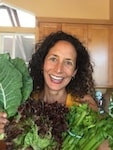You Can Still Buy Packaged Food
But “health food” isn’t always healthy
Healthy Eating: October 2019
By Kris Holden
It’s easier than you think to start eating healthy. That doesn’t mean having to spend most of the day in the kitchen.

For convenience, you can still buy pre-packaged food and you don’t have to limit yourself to the designated “health food” aisle found in many grocery stores. Surprisingly, many of those “health foods,” may not be the best choices for your health.
Food affects mood, memory, energy and overall quality of life. It’s never too late to start paying more attention to what we put into our bodies. Spending a little more money on quality nutritious food may save you later on future medical costs. Unfortunately, we can’t rely on the food industry to dictate what we should eat. We have to be our own advocates for nutrition and health.
Michael Pollan, author of The Omnivore’s Dilemma, who uncovered the realities of our industrialized food system says, “Don’t eat anything your great-grandmother wouldn’t recognize as food.” The optimal food choices should read like a recipe you can make at home. Ask yourself, can I buy the majority of these ingredients at my local grocery store?
When shopping for pre-packaged food, it can be pretty confusing not knowing if you can trust what you buy. Be wary of the labeling on the front of the product. Food companies will use positive sounding terms and purposefully misleading claims such as, “all-natural,” “cage-free,” or “low-fat.” Unfortunately, there are no regulations for companies using these food label claims and even the regulated label claims are not always properly controlled.
On a product label, the ingredients are listed in order of weight. The ingredients most used are listed first. The most nutritious ingredients should be closest to the top and the least desirable towards the end, if at all. The following are a few things I look for when doing a quick scan of ingredient lists:
1) Length – generally, the shorter the ingredient list the better.
2) Familiar – do you recognize most, if not all, the ingredients as real food, grown in nature, not made in a lab?
3) Unwanted additives – look out for artificial ingredients, they are typically long, unpronounceable words. Be aware of added sugars, anything ending in ‘ose’ (glucose, fructose, maltose, sucrose) and syrups (corn syrup, malt syrup, rice syrup).
Healthy eating isn’t about strict limitations or depriving yourself of foods you love. There are plenty of healthier options, with real-food ingredients, without the artificial additives. Eating more whole foods, foods that are closest to their natural state, can also save you money as well as benefit your health. Buying fewer single-serving processed foods and drinks and buying more fresh fruits, vegetables, legumes, and whole grains is better for your wallet, your body and the planet.
Kris Holden is a mother of three teens. She’s a Feel Good Coach with focus on healing and energizing through a plant based whole foods lifestyle. You can view other recipes and healthy food selections on Instagram @feelgoodpicks. Email: [email protected]
Recipe: Vegan Cheese Sauce
Mix it with pasta for mac and cheese, pour over broccoli or baked potato or nachos with chips and jalepenos*.
Ingredients
- 1 large Russet Potato, peeled and chopped
- 1 medium Carrot
- 1/2 cup unsalted raw Cashews, soaking optional (may soak for 4 hours or more)
- 1/3 cup Nutritional Yeast
- 2 Tbls Olive Oil
- 1 1/2 tsp Smoked Paprika
- 1 Tbls White Miso Paste

- 1 Tbls fresh Lemon juice
- 1 tsp or more Apple Cider Vinegar
- 1/4 tsp or more Salt (to taste)
- 1/8 tsp Black Pepper
Directions
1) In a medium pot, combine potato, carrot, garlic and cashews (drained and rinsed from soaking water) with enough water to cover. Bring to a boil. Cook until vegetables are tender, about 10 minutes.
2) Reserve 2 cups of cooking water. Drain and transfer cooked vegetables to a blender.
3) Blend until smooth adding reserved cooking liquid as needed for desired consistency.
4) Add remaining ingredients and blend until smooth.
* For nacho cheese sauce add some organic jarred jalapeño juice along with chopped jalepenos.







